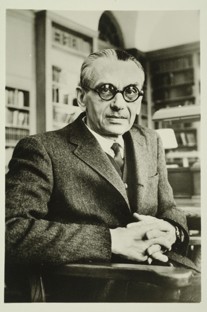Welcome to the StarkEffects.com Article on the incompleteness theorem of Kurt Gödel!
A short description of a very upsetting limitation.
Gödel's Incompleteness Theorem
 The Incompleteness Theorem states a limitation on what we can know.
The Incompleteness Theorem states a limitation on what we can know.
Gödel's incompleteness theorems, proved by Kurt Gödel in 1931, are two theorems stating the inherent limitations of all but the most trivial formal systems for arithmetic.
During Gödel's lifetime the German mathemetician Hilbert was pursuing a complete and consistent set of axioms for all of mathematics. Gödel's work states that such a set is impossible.
Gödel's first theorem:
For any consistent formal, computably enumerable theory that proves basic arithmetical truths, an arithmetical statement that is true but not provable in the theory can be constructed. That is, any effectively generated theory capable of expressing elementary arithmetic cannot be both consistent and complete.
According to Gödel, any set of axioms and rules must contain true statements that cannot be proven within that set. It may be possible to augment the set with new axioms and/or rules, but then you obtain a new set which is larger but still incomplete having statements that are true but unprovable within the system. This means that any system of axioms and rules will contain statements that cannot be proven or disproven based solely on the rules and axioms of that system. This, by extension, means that you cannot be certain that the set of rules and axioms are consistent, meaning they will never lead to contradictory statements according to the rules of the system.
Gödel's second theorem:
For any formal recursively enumerable (i.e. effectively generated) theory T including basic arithmetical truths and also certain truths about formal provability, T includes a statement of its own consistency if and only if T is inconsistent.
Quick Science & Math References
- Our Solar System.
- Earth Facts.
- The Metric System.
- Trigonometric Identities.
- Vector & Tensor Identities.
- Explicit Forms of Vector Operators
- Light & Electromagnetic Spectrum.
- Common Laser Wavelengths.
- Human Physiology Facts.
- Human History Timeline
- Geologic Timeline
- Cambrian Explosion
- Life on Earth Timeline
- ASCII Codes and HTML Display Codes
- Thousands of HTML Symbol Codes
- HTML Symbol Codes for Greek Letters
- The Best Way to put Equations on your Web Page
Physics Basics Series
- Basics of Classical Mechanics.
- Basics of Quantum Mechanics.
- Basics of Electrodynamics.
- Basics of Optics.
- Basics of Mathematical Tools for Physics.
- Basics of Plasma Physics.
- Basics of Solid State Physics.
Math Basics Series
- Numbers
- Arithmetic
- Algebra
- Geometry
- Analysis
Technology Basics Series
- Basics of Remote Sensing.
- Basics of Digital Signal Processing.
- Critical Electronic Circuits
- Infrared Imaging Basics
Knowledge Branches
- Information Theory
- How Reading Works in the Brain
- Psychology of Learning
- Logic
WORK IN PROGRESS
- What is the Stark Effect?
- The Chemistry of Love &/or Addiction
- Critical Thinking: How to question what you see, read or hear.
- Aristotle's Prior Analytics - the birth of Logic.
- Optical Solutions, lenses that solve problems
- Fractals
- PTC - Photon Transfer Curve or Mean Variance Analysis
- 3-D Noise
- Laser Primer
- Rail Guns
- Special Relativity
- Radar Technology
- Acousto-optic Cells
- Harmonic Generation for Laser Frequency Doubling (SHG) and Tripling -using non-linear crystals.
- Measurement: Accuracy & Precision.
- Things you should know about computer modeling of physical phenomena!
- Giant Magneto-resistance
- Peltier Cooling
- Pyro-Electric Detectors
- Piezo-Electric Crystals
- Laser Speckle
- FFT and DFT the fast fourier transform and the discrete fourier transform
- Fabry Perot Etalon
- The Hydrogen Atom.
- PCA (Principal Component Analysis)
- Energy per mass in fuels such as Hydrogen, Gasoline, Kerosene, HMX etc...
- Nobel prize winning work on the CCD
- How does a CCD work and what are the normal characteristics of a CCD
- Nobel Prize Winning work on Giant Magneto-resistance
- FROG -frequency resolved optical gating
- Optical Wavefront Sensing
- THz imaging and time-domain spectroscopy
- Camera Calibration
- Laser Designators
- Resampling
